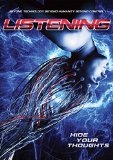| Reviews & Columns |
|
Reviews DVD TV on DVD Blu-ray 4K UHD International DVDs In Theaters Reviews by Studio Video Games Features Collector Series DVDs Easter Egg Database Interviews DVD Talk Radio Feature Articles Columns Anime Talk DVD Savant Horror DVDs The M.O.D. Squad Art House HD Talk Silent DVD
|
DVD Talk Forum |
|
|
| Resources |
|
DVD Price Search Customer Service #'s RCE Info Links |
|
Columns
|
|
|
Listening
Other // Unrated // July 26, 2016
List Price: $19.95 [Buy now and save at Amazon]
The Film:
It's been the center of conspiracy theories and running jokes for many decades now: the idea of the government using wireless communications and implanted electronic devices to control the thoughts and actions of its citizens. There remains a hitch in that thinking, though, and that comes in the development and universal implementation of devices that could actually accomplish this, which still exists in the realm of science-fiction. Listening, the indie production from Khalil Sullins, attempts to bridge that gap with relatively hard science built from a pair of young, ambitious minds, delving into the logistics and ethical concerns of developing mental communication ... and, ultimately, manipulation. Sharp ideas and philosophical undertones resonate at the center of the film, but lying underneath the conceptual chatter is a collection of stiff performances and meandering personal stories of the scientists, concerned with cleverness above coherent drama.
Listening begins in the twisted, ramshackle laboratory of two Californian graduate students making advances in the field of mental communication. David (Thomas Stroppel) married his wife, Melanie (Christine Haeberman), when they were young, largely due to the conception of their daughter, and while he slaves away at school and in his lab, she works long shifts at a diner to cover their rent and bills. David's co-researcher, Ryan (Artie Ahr), is on the other side of the spectrum: he's a charming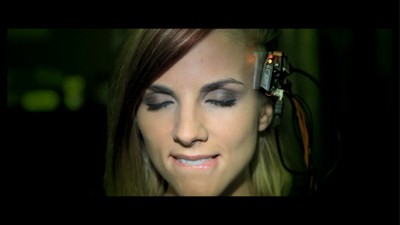 bachelor who stays in a small room with his grandmother, scraping enough money together to keep them fed. Both are, of course, penniless, which makes gathering materials for their research difficult and, at times, illegal. They're able to do so, though, and they start making major breakthroughs in their field with a little help from a third voice: Jordan, smartly and alluringly played by Amber Marie Bollinger. Once they've cracked the science, they enter into the realm of connecting to a person's deep, underlying thoughts, something highly coveted by government institutions.
bachelor who stays in a small room with his grandmother, scraping enough money together to keep them fed. Both are, of course, penniless, which makes gathering materials for their research difficult and, at times, illegal. They're able to do so, though, and they start making major breakthroughs in their field with a little help from a third voice: Jordan, smartly and alluringly played by Amber Marie Bollinger. Once they've cracked the science, they enter into the realm of connecting to a person's deep, underlying thoughts, something highly coveted by government institutions.
The lack of funds for David and Ryan's research creates both a dramatic conflict and a looming sense of disbelief in Listening, where they essentially become the Steve Jobs and Steve Wozniak of telepathic communication with fringe-science experiments and development in David's garage. Underneath the questionable real-world applications -- brain scans, spinal injections, and real-time readouts by way of a half-dozen stolen computers and other gear -- lies an intriguing rush of semi-credible technobabble, selling the illusion of this being feasible home-brewed mental networking. Director Sullins employs jittery camerawork, brash lighting, and sickly greenish-yellow hues to evoke a specific livewire mood in their research, heightened by his concentration on the enthralling implications of what each step entails in their research, selling the illusion with extensive discussion about the details and visual cues involving the tests themselves.
The concepts provide a sound foundation for contemplative science-fiction, but Listening struggles with honing in on dramatic credibility in response to it, weighed down by the stories going on around the research itself. Both David and Ryan's individual situations are heartbreaking, involving the repercussions of hubris, the lingering pain of loss, and the daily struggles that puts them both in desperate need of money and/or a solution, underpinned by the two geniuses' differences in personality. The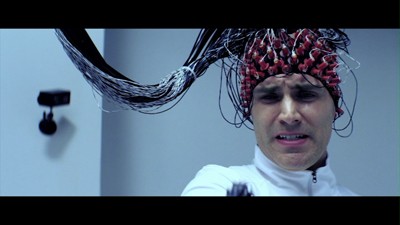 performance value gets lost in the noise, though, navigated by good-meaning but hollowed dramatic projections from Thomas Stroppel and Artie Ahr, whom struggle to give the repetitive, slowly deteriorating state of their personal lives the right kind of meaningful variation between conflicts. Had the story not relied on their crumbling situations being in concert with the film's elevated stakes, instead giving David and Ryan boundless resources in a lab and letting the science (and resulting suspense) speak for itself, this would've mattered less.
performance value gets lost in the noise, though, navigated by good-meaning but hollowed dramatic projections from Thomas Stroppel and Artie Ahr, whom struggle to give the repetitive, slowly deteriorating state of their personal lives the right kind of meaningful variation between conflicts. Had the story not relied on their crumbling situations being in concert with the film's elevated stakes, instead giving David and Ryan boundless resources in a lab and letting the science (and resulting suspense) speak for itself, this would've mattered less.
Listening certainly picks up the pace alongside the research's development and how it's discovered by other interested parties later on, creating a briskly-paced thriller hinged on espionage, ethical boundaries, and draconian control through these cranium-attached devices. The situation elevates into an Orwellian nightmare not without a fair share of deeper musings on surveillance and the limitless possibilities of research, but the actual events of the story struggle to keep pace with the endgame that director Khalil Sullins rushes toward, held back by peculiar character shifts and head-scratching plot twists. Wires get crossed in the film's wishy-washy perception of the fragilities and strengths of the mind, which leads to a grand square-off between the might of technology and the human brain's willpower in fighting off such an invasive force. Staying plausible while exploring such a high-concept premise proves to be a tougher nut than writer/director Sullins can crack in his ambitious feature debut.
The DVD:
Video and Audio:
Acidic greens and gloomy blue are cast over most scenes in Listening, framed at 2.35:1 and enhanced for 16x9 televisions in this transfer from MVD Visual. The harshness of the color palette and the general darkness of the images impact the amount of detail one can see in many sequences, illustrated by the incredibly robust, natural clarity of images found in brighter -- and largely non-filtered -- sequences, from skin textures and tree leaves to circuitry. These scenes also showcase the disc's hidden strengths in skin tones, which have to contend with heavy saturation and contrast in most other instances, though the color gradation looks appropriate throughout. Black levels can be heavy, edging out details at times, but they also accentuate the image's depth at most points. It's an incredibly stylized film, and the transfer replicated those desires accordingly.
Audio comes in a pair of Dolby Digital tracks, a 5.1 and 2.0, though there's very little different to really be heard between the two, given that the vast majority of the activity resonates in the front channels. Clarity of dialogue stays strong and nuanced, using the lower-frequency channel for support in sounding natural, while digital blips and real-world sizzles cautiously but successfully push on the upper shelf of the track. Some separation comes across in some of the fuller aural elements, especially during the mental communication sequences, but most of the activity finds a comfortable home in the center of the track, projecting the well-paced music with the right caliber of heft. It's a suitable, yet unimpressive audio display.
Special Features:
Listening comes with a pair of short but sharp special featurettes: Making the Score (6:18, 16x9), a nice glimpse at the beautiful, crucial orchestral accompaniment from the film guided by composer Edward Patrick White and writer/director Khalil Sullins, intermixed with behind-the-scenes shots and interview; and A Look at Editing Listening (5:11, 16x9), which actively discusses the visual effects achieved by the film, especially the jittery faux-3D shot whenever participants go into the mental communication. Also included is a nice British Film Institute Q&A (15:58, 16x9) with Sullins, composer Edward Patrick White, producer Pardis Sullins, and actor Thomas Stroppel, which delves into some of the casting, script-reading, and real-world influences.
Rounding things out is a Theatrical Trailer (1:46, 16x9 HD), some Alternate Poster and Behind the Scenes Photos.
Final Thoughts:
Bold science-fiction ideas and brisk tension give Listening a rush of energy, sporting well-crafted indie production values from writer/director Khalil Sullins as he achieves a bleak, provocative mood. Lackluster performances, head-scratcher developments, and a generally unimpressive plot surrounding the scientific and philosophical ideas mute its strengths, though, keeping it from the annals of truly successful low-budget flicks about rogue researchers tapping into fringe science. Rent It.
Thomas Spurlin, Staff Reviewer -- DVDTalk Reviews | Personal Blog/Site
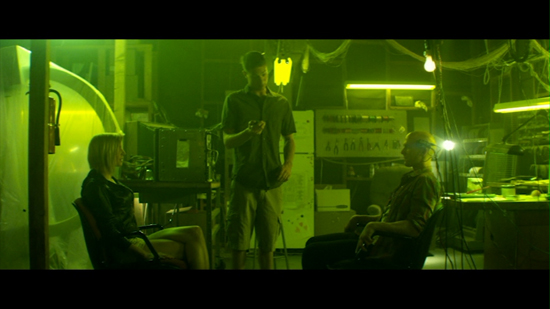 |
It's been the center of conspiracy theories and running jokes for many decades now: the idea of the government using wireless communications and implanted electronic devices to control the thoughts and actions of its citizens. There remains a hitch in that thinking, though, and that comes in the development and universal implementation of devices that could actually accomplish this, which still exists in the realm of science-fiction. Listening, the indie production from Khalil Sullins, attempts to bridge that gap with relatively hard science built from a pair of young, ambitious minds, delving into the logistics and ethical concerns of developing mental communication ... and, ultimately, manipulation. Sharp ideas and philosophical undertones resonate at the center of the film, but lying underneath the conceptual chatter is a collection of stiff performances and meandering personal stories of the scientists, concerned with cleverness above coherent drama.
Listening begins in the twisted, ramshackle laboratory of two Californian graduate students making advances in the field of mental communication. David (Thomas Stroppel) married his wife, Melanie (Christine Haeberman), when they were young, largely due to the conception of their daughter, and while he slaves away at school and in his lab, she works long shifts at a diner to cover their rent and bills. David's co-researcher, Ryan (Artie Ahr), is on the other side of the spectrum: he's a charming
 bachelor who stays in a small room with his grandmother, scraping enough money together to keep them fed. Both are, of course, penniless, which makes gathering materials for their research difficult and, at times, illegal. They're able to do so, though, and they start making major breakthroughs in their field with a little help from a third voice: Jordan, smartly and alluringly played by Amber Marie Bollinger. Once they've cracked the science, they enter into the realm of connecting to a person's deep, underlying thoughts, something highly coveted by government institutions.
bachelor who stays in a small room with his grandmother, scraping enough money together to keep them fed. Both are, of course, penniless, which makes gathering materials for their research difficult and, at times, illegal. They're able to do so, though, and they start making major breakthroughs in their field with a little help from a third voice: Jordan, smartly and alluringly played by Amber Marie Bollinger. Once they've cracked the science, they enter into the realm of connecting to a person's deep, underlying thoughts, something highly coveted by government institutions. The lack of funds for David and Ryan's research creates both a dramatic conflict and a looming sense of disbelief in Listening, where they essentially become the Steve Jobs and Steve Wozniak of telepathic communication with fringe-science experiments and development in David's garage. Underneath the questionable real-world applications -- brain scans, spinal injections, and real-time readouts by way of a half-dozen stolen computers and other gear -- lies an intriguing rush of semi-credible technobabble, selling the illusion of this being feasible home-brewed mental networking. Director Sullins employs jittery camerawork, brash lighting, and sickly greenish-yellow hues to evoke a specific livewire mood in their research, heightened by his concentration on the enthralling implications of what each step entails in their research, selling the illusion with extensive discussion about the details and visual cues involving the tests themselves.
The concepts provide a sound foundation for contemplative science-fiction, but Listening struggles with honing in on dramatic credibility in response to it, weighed down by the stories going on around the research itself. Both David and Ryan's individual situations are heartbreaking, involving the repercussions of hubris, the lingering pain of loss, and the daily struggles that puts them both in desperate need of money and/or a solution, underpinned by the two geniuses' differences in personality. The
 performance value gets lost in the noise, though, navigated by good-meaning but hollowed dramatic projections from Thomas Stroppel and Artie Ahr, whom struggle to give the repetitive, slowly deteriorating state of their personal lives the right kind of meaningful variation between conflicts. Had the story not relied on their crumbling situations being in concert with the film's elevated stakes, instead giving David and Ryan boundless resources in a lab and letting the science (and resulting suspense) speak for itself, this would've mattered less.
performance value gets lost in the noise, though, navigated by good-meaning but hollowed dramatic projections from Thomas Stroppel and Artie Ahr, whom struggle to give the repetitive, slowly deteriorating state of their personal lives the right kind of meaningful variation between conflicts. Had the story not relied on their crumbling situations being in concert with the film's elevated stakes, instead giving David and Ryan boundless resources in a lab and letting the science (and resulting suspense) speak for itself, this would've mattered less. Listening certainly picks up the pace alongside the research's development and how it's discovered by other interested parties later on, creating a briskly-paced thriller hinged on espionage, ethical boundaries, and draconian control through these cranium-attached devices. The situation elevates into an Orwellian nightmare not without a fair share of deeper musings on surveillance and the limitless possibilities of research, but the actual events of the story struggle to keep pace with the endgame that director Khalil Sullins rushes toward, held back by peculiar character shifts and head-scratching plot twists. Wires get crossed in the film's wishy-washy perception of the fragilities and strengths of the mind, which leads to a grand square-off between the might of technology and the human brain's willpower in fighting off such an invasive force. Staying plausible while exploring such a high-concept premise proves to be a tougher nut than writer/director Sullins can crack in his ambitious feature debut.
The DVD:
 | 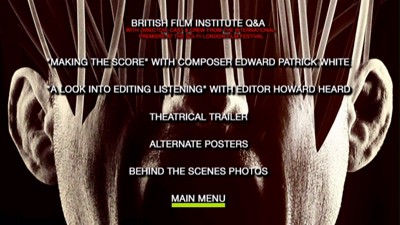 |
Video and Audio:
Acidic greens and gloomy blue are cast over most scenes in Listening, framed at 2.35:1 and enhanced for 16x9 televisions in this transfer from MVD Visual. The harshness of the color palette and the general darkness of the images impact the amount of detail one can see in many sequences, illustrated by the incredibly robust, natural clarity of images found in brighter -- and largely non-filtered -- sequences, from skin textures and tree leaves to circuitry. These scenes also showcase the disc's hidden strengths in skin tones, which have to contend with heavy saturation and contrast in most other instances, though the color gradation looks appropriate throughout. Black levels can be heavy, edging out details at times, but they also accentuate the image's depth at most points. It's an incredibly stylized film, and the transfer replicated those desires accordingly.
Audio comes in a pair of Dolby Digital tracks, a 5.1 and 2.0, though there's very little different to really be heard between the two, given that the vast majority of the activity resonates in the front channels. Clarity of dialogue stays strong and nuanced, using the lower-frequency channel for support in sounding natural, while digital blips and real-world sizzles cautiously but successfully push on the upper shelf of the track. Some separation comes across in some of the fuller aural elements, especially during the mental communication sequences, but most of the activity finds a comfortable home in the center of the track, projecting the well-paced music with the right caliber of heft. It's a suitable, yet unimpressive audio display.
Special Features:
Listening comes with a pair of short but sharp special featurettes: Making the Score (6:18, 16x9), a nice glimpse at the beautiful, crucial orchestral accompaniment from the film guided by composer Edward Patrick White and writer/director Khalil Sullins, intermixed with behind-the-scenes shots and interview; and A Look at Editing Listening (5:11, 16x9), which actively discusses the visual effects achieved by the film, especially the jittery faux-3D shot whenever participants go into the mental communication. Also included is a nice British Film Institute Q&A (15:58, 16x9) with Sullins, composer Edward Patrick White, producer Pardis Sullins, and actor Thomas Stroppel, which delves into some of the casting, script-reading, and real-world influences.
Rounding things out is a Theatrical Trailer (1:46, 16x9 HD), some Alternate Poster and Behind the Scenes Photos.
Final Thoughts:
Bold science-fiction ideas and brisk tension give Listening a rush of energy, sporting well-crafted indie production values from writer/director Khalil Sullins as he achieves a bleak, provocative mood. Lackluster performances, head-scratcher developments, and a generally unimpressive plot surrounding the scientific and philosophical ideas mute its strengths, though, keeping it from the annals of truly successful low-budget flicks about rogue researchers tapping into fringe science. Rent It.
|
| Popular Reviews |
| Sponsored Links |
|
|
| Sponsored Links |
|
|
| Release List | Reviews | Shop | Newsletter | Forum | DVD Giveaways | Blu-Ray | Advertise |
|
Copyright 2024 DVDTalk.com All Rights Reserved. Legal Info, Privacy Policy, Terms of Use,
Manage Preferences,
Your Privacy Choices | |||||||









